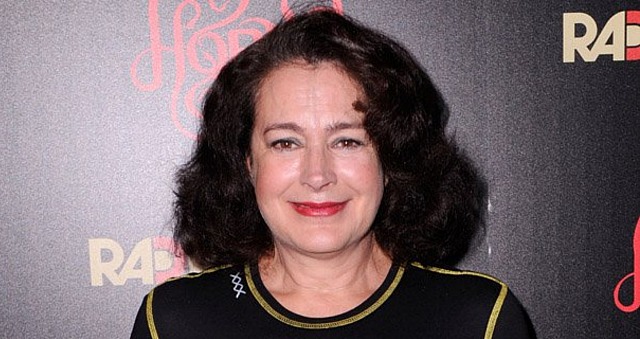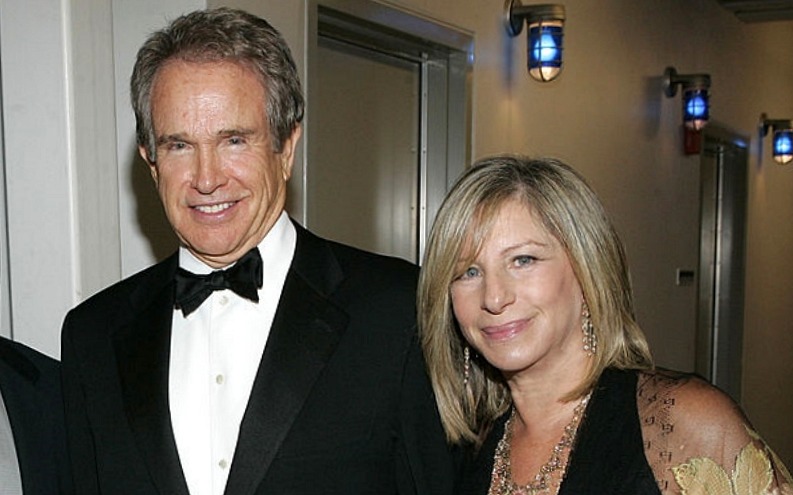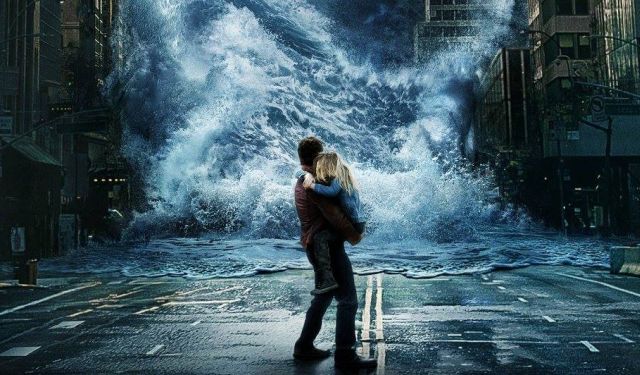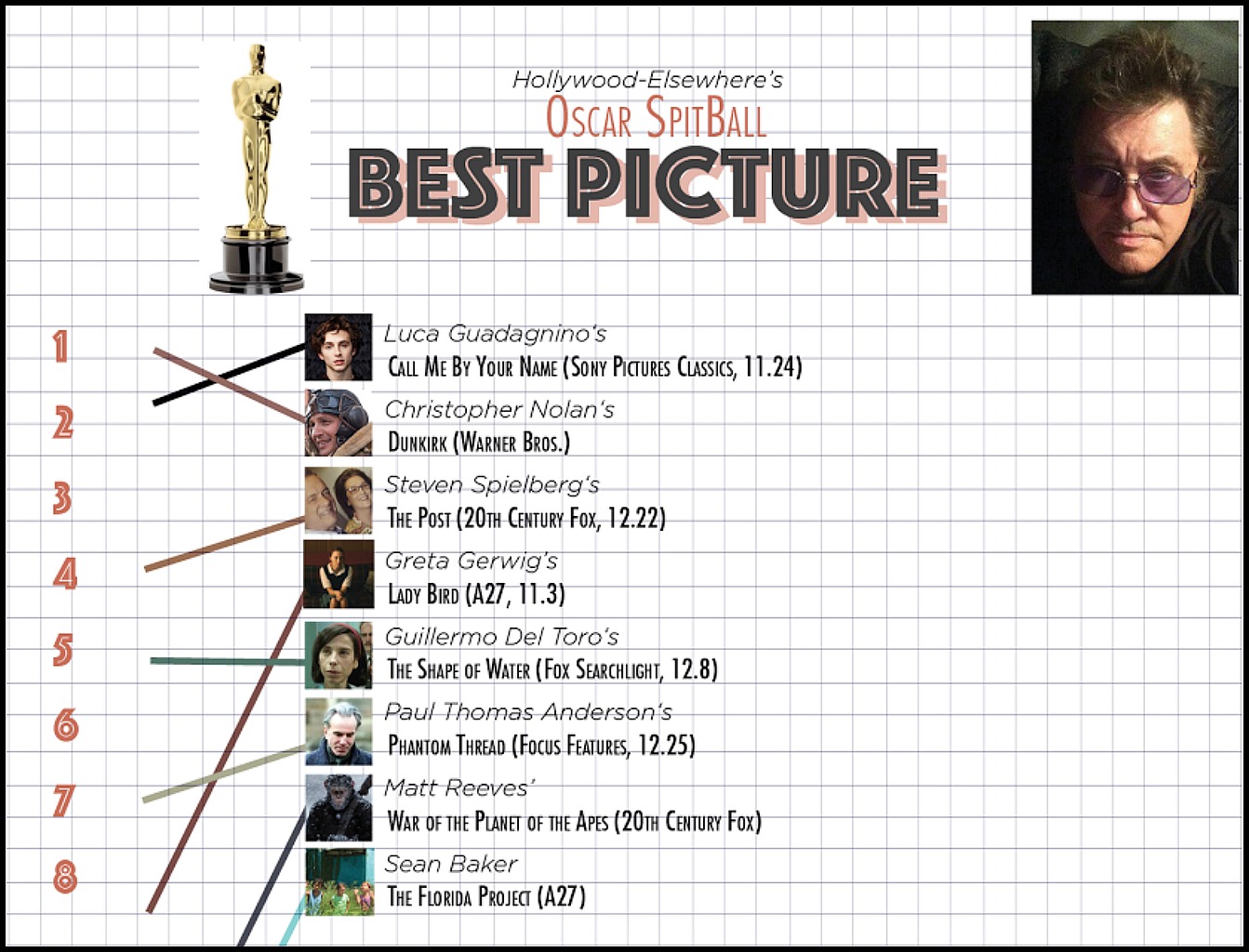I liked Tootsie as far as it went, but I was never over-the-moon about it. And I never understood the screaming hilarity that greeted Bill Murray‘s kicker at the end of Dustin Hoffman‘s big wig-removing scene — “That is one nutty hospital.” I realized, of course, that it was intended to stop the show, but the first time I watched Tootsie at the Zeigfeld all-media I didn’t even come close to laughing. I just went “uh-huh, okay, not bad.” What’s the definition of a great kicker line? One that you laugh or at least smile at even though you’ve heard it 35 or 40 times. “So we’re even,” “Nobody’s perfect,” “Because I just went gay all of a sudden!,” “Traffic was a bitch,” etc.
 Jeffrey Wells
Jeffrey Wells
Streisand’s Curious Allegiance
During a 10.19 podcast in Austin with “Dudley and Bob with Matt,” the fearless and legendary Sean Young passed along two noteworthy sexual harassment anecdotes from the early to mid ’90s, one involving Harvey Weinstein and the other concerning Barbra Streisand.
The Harvey thing is funny but almost a so-whatter. If you ask me the Streisand story is the eye-opener.
Young claimed that Harvey whipped out his gross animal member sometime before, during or after the making of Miramax’s Love Crimes, and that her response was ‘You know, Harvey, I really don’t think you should be pulling that thing out…it’s not very pretty.'”
During a pre-production interview with Streisand about a role in The Mirror Has Two Faces (’96), Young claims that Streisand harshly criticized her for talking to the press about having been sexually harassed by Warren Beatty during the making of Dick Tracy. (Beatty has denied the incident.) “I think it’s disgusting that you talked to the press!” Streisand allegedly hissed. In the podcast Young says, “And what I had said to the press was that I was harassed. That I was sexually harassed by Warren Beatty. And she told me she thought that was disgusting.” Young adds that Streisand mentioned at the time that she herself had “been” with Beatty.
The Weinstein anecdote is mentioned around the five-minute mark; the Streisand story happens about a minute later.

Who Would’ve Thought?
“What we can’t have is the same old politics of division that we have seen so many times before. That dates back centuries. Some of the politics that we see now…we thought we put that to bed. That’s folks lookin’ 50 years back. It’s the 21st Century, not the 19th Century. C’mon!” — Barack Obama speaking yesterday in New Jersey for Democratic gubernatorial candidate Phil Murphy.
The Shaming
When an obviously crappy film comes along, my heart goes out to the cast members. They were paid reasonable fees, of course, and I realize that “a job is just a job,” but the Geostorm downside is that their faces and personas are being internationally splattered with exploitation mud. Gerard Butler can’t sink much lower, having lately made nothing but cheeseball action-disaster flicks. But poor Jim Sturgess! Ten years ago he was the hot new guy — Across the Universe, The Other Boleyn Girl, 21. Not to mention Abbie Cornish, Alexandra Maria Lara, Richard Schiff, Ed Harris and Andy García. I feel their discomfort.
From Peter Debruge‘s Variety review: “If you’ve ever wanted to see a tidal wave sweep over the horizon of a waterless desert or eggs frying on a superheated city street, Geostorm is the movie for you! And if you’re one of the millions of human beings on this planet who was recently impacted by hurricanes and tropical storms, well, Dean Devlin’s ill-timed destruct-a-thon (already delayed more than a year from its intended March 2016 release) succeeds in being even more callously insensitive/offensive than our president’s response to your plight. Then again, the only thing more reliable than bad weather is bad movies, and in that respect, Geostorm is right on forecast.”
Deadwood
If you need to pick up a parcel or special-delivery letter at a Los Angeles post office, for the most part you need to be there by 5 pm. (One or two close at 5:30, others close at 4 but most close at 5 — 95% open their doors between 9 and 10 am.)
That means, of course, that if you work a regular 9-to-5 job you’ll either have to pick up the parcel during lunch hour (and thereby lose the comfort of a relaxing lunch) or leave an hour early. And relatively few businesses, remember, close at 5 pm — most are open until 6 pm and some later than that.
It seems to me that governmental post offices should, if they wanted to be half-humane about it, give people a fighting chance to pick up parcels or special-delivery letters at the end of the day by remaining open until 6 pm. Or, at the very least, by remaining open until 6 pm on alternate days. (Tuesdays and Thursdays, say.) That would be the considerate thing. And yet for decades 5 pm closings have been the rule. The message from this governmental agency to the general public, obviously, is “our internal scheduling concerns are what matter to us…we realize we’re making things inconvenient if not difficult for untold thousands of post-office customers on a daily basis, but we’re not exactly in the people-pleasing business…are we? We do things our way and that’s that. Adapt or lose.”
Kelly’s Racially Thorny Boston Roots
While defending President Donald Trump‘s “brave” condolence call to a Gold Star family, Chief of Staff Gen. John Kelly attacked Rep. Frederica Wilson, calling her an “empty barrel.” Lawrence O’Donnell: “The word ‘brave’ has absolutely no application with the word ‘Trump.'”
Only The Trumpies?
In my positive review of Joseph Kosinski‘s Only The Brave (Sony, 10.20), a firefighting drama set in Prescott, Arizona, I mentioned that the characters are all “youngish and white, Prescott being one of the whitest cities in the country….each and every character is Wonderbread.”
I mentioned that I felt “slightly bothered by the fact that these guys are probably all red-state conservatives but I got past that.” I also said that “when the big tragedy finally hits…I wouldn’t want to lie and say I didn’t feel slightly conflicted about the fact that the 19 real-life victims probably would have voted for Donald Trump had they lived, but I felt the sadness, for sure.”
All to say that Only The Brave is a red-state flick about brawny, beer-drinking men doing the hard firefighting thing, and that it’s aimed at red-state beefalos.
In any event, Brent Lang‘s Variety story about Brad Parscale, the digital media director for Donald Trump’s 2016 presidential campaign, having been hired by Only the Brave producers to help sell the film to red-state moviegoers, falls right into line.
“Black Label Media, the film’s financier, retained Parscale to supplement online and social media marketing efforts,” Lang reports. “Sony Pictures is distributing the $38 million production, which is on track to open to a weak $6 million when it debuts this weekend.”
Under different circumstances I might feel irked about a Trump campaigner trying to sell an inspirational red-state film, but the bottom line, as I said on 10.11, is that Only The Brave is better than decent.
“In movie-lore terms the Only The Brave firefighters are a team of Howard Hawks hombres, or guys who measure themselves by the same macho yardstick that Cary Grant applied in Only Angels Have Wings and which John Wayne demanded of his men in Red River. ‘How good are you?’, ‘Do you have what it takes?’, ‘Can I depend on you when the heat comes down and the going gets tough?'” etc.
Mommy, Can I Be Facially Deformed Too?
A few months ago Stephen Chbosky‘s Wonder (Lionsgate, 11.17) was being sold as a delicate family drama in the vein of Peter Bogdanovich‘s Mask. Based on three relatively recent novels by R.J. Palacio, it’s about the journey of a young kid with a facial deformity (Jacob Tremblay) as he acclimates to school, and how his parents (Julia Roberts, Owen Wilson) and extended family help him along.
Five months ago (i.e., late May) a trailer popped. [See after the jump.] It suggested that the film would be partly about fear and trepidation and grade-school cruelty, and partly about love and kindness and family support. Sad to say, any half-realistic story about a facially deformed child would include depictions of cruelty at school, as kids can be absolutely heartless when it comes to judgments and dismissals of kids that are “different.”
Unfortunately, the trailer that popped today is about nothing but warm and glowing feel-good vibes. It’s all about gobs of parental love and hugs and tears of joy. It’s basically selling a film about what a wondrous and magical thing it is for a kid to be facially deformed. In short, the marketing guys seem to be panicking.
Welts, Woundings
During the 2017 Toronto Film Festival the Boston Globe‘s Janice Page wrote that I, Tonya is “hilarious, sharp, snarling, pitch perfect.” Trust me, it is only one of those things — i.e., snarling. I wrote that “unless you have a strange liking for the company of losers, abusers and total dipshits, you’ll definitely want to steer clear of this cesspool exercise. It lasts 119 minutes, and it feels, trust me, like 139 or 149.”
I also called it “an exaggerated, pugilistic black farce.”
“An Ugly Stick Movie That Will Leave Welts,” posted on 9.12.17: “Abuse begets more abuse, and abused victims sometimes (often?) seek out fresh replacement abusers. And so Tonya Harding‘s bitter, chain-smoking mom, Lavona, beat and belittled her daughter from age of 7 onward, and as teenaged and then 20-something Tonya ascended in the figure-skating realm she became a ferociously angry abuser herself with a huge chip on her shoulder…what else?
“Tonya married and then separated from an abusive, moustache-wearing asshole, Jeff Gillooly, who conspired to have Harding’s skating rival Nancy Kerrigan temporarily disabled with a police-baton blow to the knee, and with many presuming, fairly or unfairly, that Harding was aware of Gillooly’s plan and was more or less down with it.
“When I, Tonya ended I turned to the guy next to me and said, ‘How long was that?’ ‘Two hours,’ he said. ‘Good God,’ I replied.
“Am I the only honest, straight-shooting journo-critic in Toronto right now? I, Tonya is cinematic abuse, pure and simple. It’s an ugly pill from hell — a violent, vulgar, relentlessly profane assembly of lower-middle-class white-trash types beating on each other and smoking and swearing and losing their tempers and causing cuts and swellings. It’s a tacky portrait of American self-loathers, brawlers, grotesques, hungry-for-famers, human garbage, etc.
“Certainly Our Goal Is To Be Preemptive…”
I’ve only seen two episodes of Joe Penhall and David Fincher‘s Mindhunter, the ten-part Netflix series about the beginnings of the FBI’s serial crime unit, but I’m already impressed and looking forward to the remaining eight. David Fincher directed these episodes with an unhurried, even-toned hand. Partly Son of Zodiac (set in the late ’70s) and partly I-don’t-know-what-yet, it’s a serving of methodic, step-by-step naturalism. Creepy but real. Perfectly performed by costars Jonathan Groff and Holt McCallany. Beautifully shot by Erik Messerschmidt. A striking supporting performance by Cameron Britton as serial killer Edmund Kemper. I can’t wait until they run into Richard Speck. It’s about study more than anything else, and it chills right down to the bone.
Gotham Noms Are About Da Coolness
It was announced this morning that Jordan Peele‘s Get Out has scored four Gotham Award nominations — Best Feature, Best Breakthrough Director, Best Screenplay and Best actor (Daniel Kaluuya). Identity politics had nothing to do with this. Ditto the fact that Get Out has earned $175,484,140 domestically and $253 million worldwide. These four Gotham noms were entirely driven by the inescapable conclusion that Get Out is a delightfully on-target racial satire-cum-horror film as well as a heart-touching tribute to the films and careers of Larry Cohen and John Carpenter. Not to mention those brilliantly hypnotic special effects.
HE predictions are based on which nominees are the most politically favored by the cool kidz…

Best Feature / Call Me by Your Name (Sony Pictures Classics); The Florida Project (A24); Get Out (Universal Pictures); Good Time (A24); and I, Tonya (NEON) — Likeliest winners: Call Me By Your Name or The Florida Project.
Best Documentary / Ex Libris – The New York Public Library (Zipporah Films); Rat Film (MEMORY and Cinema Guild); Strong Island (Netflix); Whose Streets? (Magnolia Pictures); The Work (The Orchard and First Look Media) — Likeliest Winner: Ex Libris – The New York Public Library.
Bingham Ray Breakthrough Director Award / Maggie Betts for Novitiate (Sony Pictures Classics); Greta Gerwig for Lady Bird (A24); Kogonada for Columbus (Superlative Films/Depth of Field); Jordan Peele for Get Out (Universal Pictures); Joshua Z Weinstein for Menashe (A24) — Likeliest winners: Jordan Peele or Greta Gerwig.
Best Screenplay / The Big Sick, Emily V. Gordon and Kumail Nanjiani (Amazon Studios);
Brad’s Status, Mike White (Amazon Studios); Call Me by Your Name, James Ivory (Sony Pictures Classics); Columbus, Kogonada (Superlative Films/Depth of Field); Get Out, Jordan Peele (Universal Pictures); Lady Bird, Greta Gerwig (A24) — Likeliest Winners: The Big Sick, Get Out or Lady Bird.
Best Actor / Willem Dafoe in The Florida Project (A24); James Franco in The Disaster Artist (A24); Daniel Kaluuya in Get Out (Universal Pictures); Robert Pattinson in Good Time (A24); Adam Sandler in The Meyerowitz Stories (New and Selected) (Netflix); Harry Dean Stanton in Lucky (Magnolia Pictures) — Likeliest Winners: Willem Dafoe or Harry Dean Stanton (posthumously).



